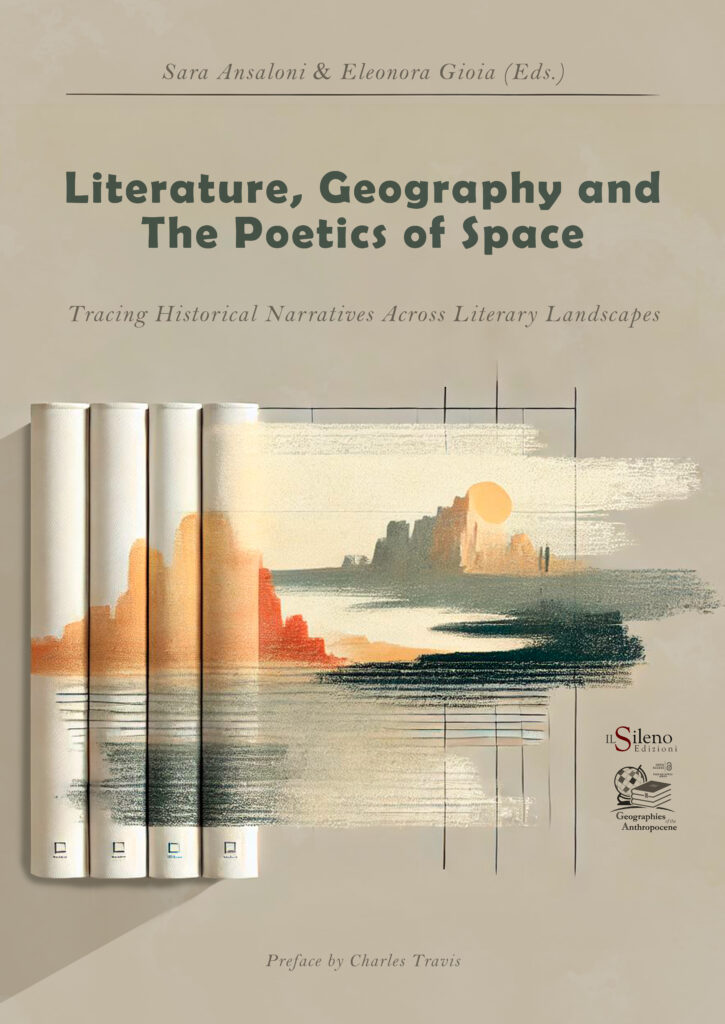
Eleonora Gioia, Sara Ansaloni
(Eds.)
Literature, Geography and the Poetics of Space. Tracing Historical Narratives Across Literary Landscapes
ISBN 979-12-80064-75-2
Year: 2024;
Pages: 210;
Language: English;
Format: e-book;
Vol. 7, No. 2, December 2024
Description
This volume examines the interdisciplinary nexus of literature and geography through a multifaceted lens, blending theories from cultural studies, narratology, and spatial analysis. Beginning with a systemic understanding of literary geography, the chapters explore imaginative, political, and ecological landscapes, emphasizing their relational and dynamic nature. Contributions analyze the production of place and space, highlighting their role in shaping cultural, historical, and environmental narratives.
Key topics include the interplay between memory, identity, and travel in literary geographies, the cultural significance of territorial disputes, and the transformative potential of ecological narratives in the Anthropocene. Methodological frameworks range from geocriticism and literary cartography to ecocritical and geopolitical analyses. Case studies span diverse contexts, such as French 18th-century travel narratives, Etruscan agricultural practices, and Hayao Miyazaki’s ethical landscapes. Themes of power, positionality, and environmental responsibility are examined through postcolonial, feminist, and ecological perspectives, illustrating the creative and critical capacities of literature to reshape spatial imaginaries. The volume introduces innovative concepts, including the cultural critique of geopolitics in avant-garde aesthetics, mnemonic geographies in Jewish narratives, and urban-nature dynamics in Romantic fairy tales. The contributions underscore the ethical and performative dimensions of literary geographies, revealing how storytelling fosters new spatial understandings and responses to global challenges. By reimagining real and fictional spaces this work demonstrates the transformative interplay of literature and geography in shaping our understanding of history, culture, and the environment.
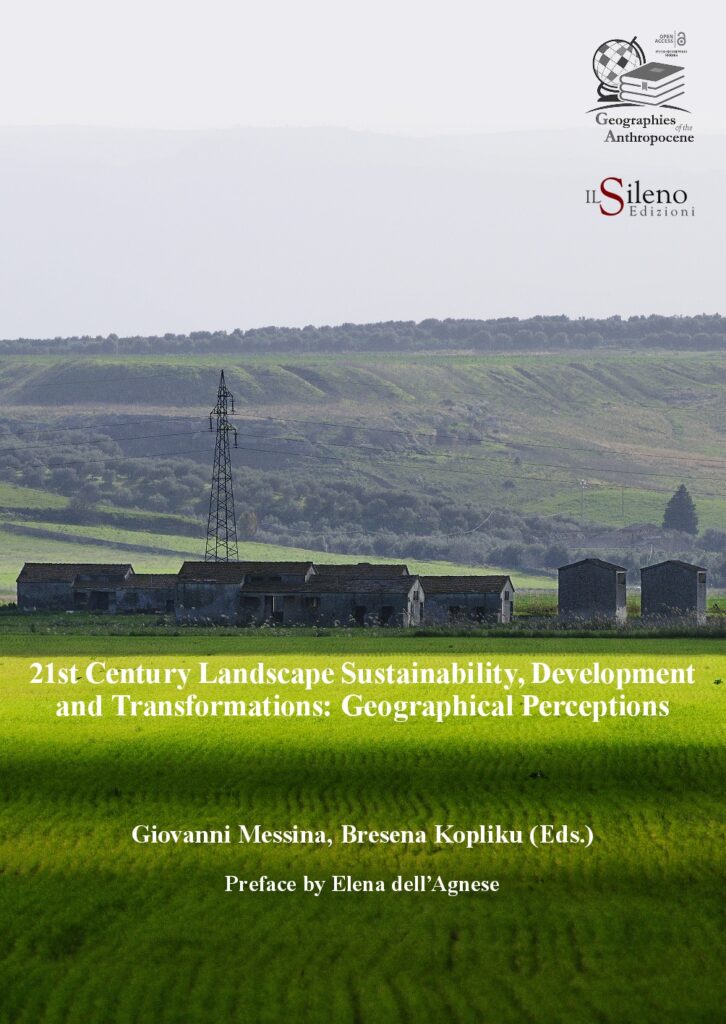
Giovanni Messina, Bresena Kopliku
(Eds.)
21st CENTURY LANDSCAPE SUSTAINABILITY, DEVELOPMENT AND TRANSFORMATIONS: GEOGRAPHICAL PERCEPTIONS
ISBN 979-12-80064-61-5
Year: 2024;
Pages: 321;
Language: English;
Format: e-book;
Vol. 7, No. 1, May 2024
Description
Territories continue to transform due to endogenous and exogenous development drives. The thickening of logistics and transport networks, large commercial hubs, energy supply options, agricultural and industrial policies, tourism and migrations constitute then, individually and in a systemic sense, some of the lenses available to read the transformative dynamics of territories in the crucial current geopolitical
context. In addition, the increasing reach of digital technologies in the spaces and practices of our daily lives, has changed the way we perceive and use the landscape. These transformations find a reified outcome in landscape transitions, becoming a foothold for a trans-scale geographical reflection. We therefore want to insert this volume on this horizon. In fact, we have wanted to stimulate the geographical community to try their hand at landscape analysis to identify, through methodological and/or applied research contributions, problems, practices and trajectories inherent in the transformative dynamics of territories, compressed between the urgency of development and the need to change the energy and consumption paradigm.
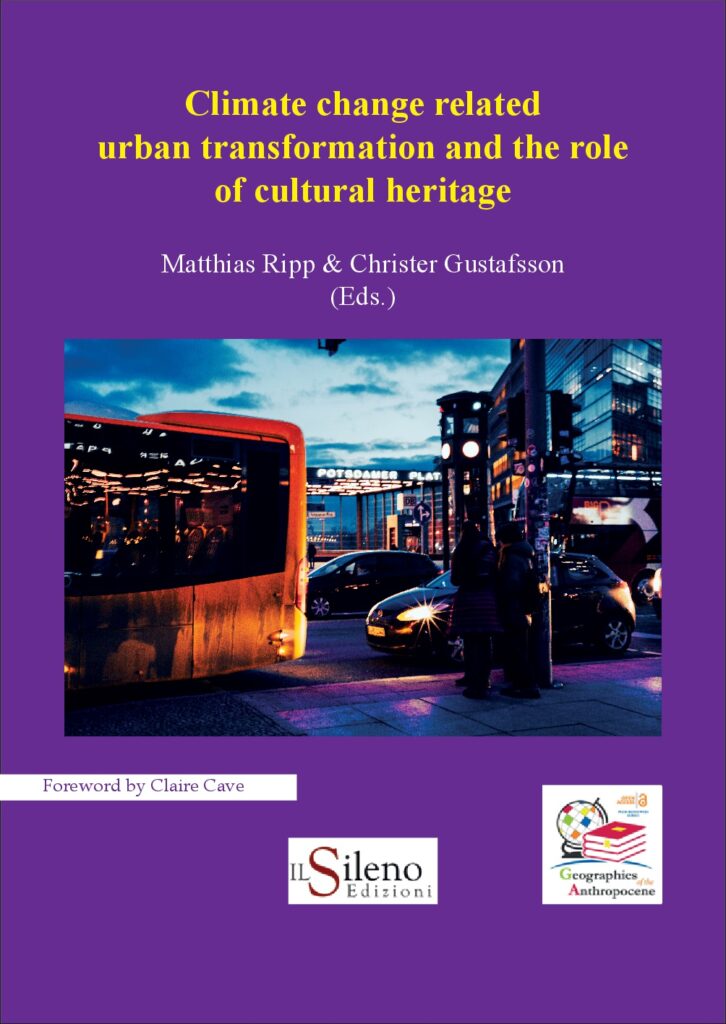
Matthias Ripp & Christer Gustafsson
(Eds.)
CLIMATE CHANGE RELATED URBAN TRANSFORMATION AND THE ROLE OF CULTURAL HERITAGE
ISBN 979-12-80064-58-5
Year: 2023;
Pages: 308;
Language: English;
Format: e-book;
Vol. 6, No. 2, December 2023
Description
Starting with a systemic understanding of cultural heritage, climate-change related urban transformation processes are analyzed through a multi-disciplinary lens and methods that blend the arts, humanities, and sciences. Governance-specific topics range from relevant cultural markers and local policies to stimulate resilience, to a typology of heritage-related governance and the vulnerability of historic urban landscapes. A variety of contributions from the Americas, Asia, and Europe describe and analyze challenges and potential solutions for climate-change related urban transformation and the role of cultural heritage. Contributions focusing on innovation, adaptation, and reuse introduce the concept of urban acupuncture, adaptive reuse of industrial heritage, and how a historical spatial-functional network system can be related to a smart city approach. The potential role of cultural traditions for resilience is analyzed, as is the integration of sustainable energy production tools in a historic urban landscape. Examples of heritage-based urban resilience from around the world are introduced, as well as the path of medium-technology to address climate adaptation and prevention in historic buildings. The contributions emphasize the need for an updated narrative that cultural heritage can also contribute to climate adaptation and mitigation.
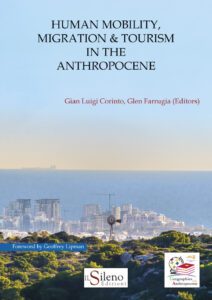
Gian Luigi Corinto, Glen Farrugia
(Eds.)
HUMAN MOBILITY, MIGRATION & TOURISM IN THE ANTHROPOCENE
ISBN 979-12-80064-52-3
Year: 2023;
Pages: 186;
Language: English;
Format: e-book;
Vol. 6, No. 1, May 2023
Description
This book offers a comprehensive examination of the dynamic interplay between human mobility, migration, and tourism in the context of the Anthropocene era. The collection of eight chapters delves into various aspects of this complex relationship, shedding light on crucial issues, challenges, and opportunities in today’s rapidly evolving global landscape. The concept of responsible tourism is a transversal element in this publication, exploring its significance in promoting sustainable practices and mitigating the environmental and socio-cultural impacts of movement of people. Another topic which is addressed here is the post-Covid regeneration of tourism-dependent island economies. The authors analyze the challenges faced by these regions and explore innovative approaches to sustainable recovery. The discussions here revolve around the importance of community engagement, diversification, and resilience in building a robust and sustainable tourism industry. Sustainability also takes a center stage in this edition. The discourse presented in various chapters examines the pressing environmental issues associated with the movement of people. It also delves into the transformation of the hotel industry and explores tourism opportunities in isolated geographical exclave, shedding light on unique destinations that face challenges related to accessibility and connectivity. Important analysis is also presented on cultural landscapes, heritage sites, and local traditions and how cultural authenticity and meaningful interactions between tourists and local communities can shape the tourist experience.
This book will be of great interest to scholars, researchers, policymakers, and practitioners seeking to understand and navigate the challenges and opportunities that arise in this rapidly changing global landscape.
 Enrico Nicosia
Enrico Nicosia
Lucrezia Lopez
(Eds.)
CINEMA, DISASTERS AND THE ANTHROPOCENE
ISBN 979-12-80064-39-4
Year: 2022;
Pages: 223;
Language: English;
Format: e-book;
Vol. 5, No. 2, December 2022
Description
The Anthropocene concept identifies a geological era in which human action leads to changes on a planetary scale with long-term irreversible effects. This volume collects insights into geographical research, with a specific look at the challenges of the future, and the potential of visual communication offered by cinema, documentaries and television series. In fact, fiction could represent the appropriate medium to examine the notions of the Anthropocene, being a language of global diffusion and highly evocative since it uses the engagement of narration and entertainment to convey messages of vital importance, arousing emotions in the viewer, shared awareness and, finally, responsibility. In the Anthropocene era, the challenge of climate change is not a problem of science but a failure of politics. And politics fails because the Great Acceleration has led to the good life and certainly a better life for people everywhere. Who is willing to give up the great stuff of the Great Acceleration? What would that new life look like? What kind of challenges does the future propose? Some of these questions, among others, are raised in the chapters of the present volume. The different geographical contexts and approaches, here collected, can play an important clarifying function, to reduce the complexity of (today’s) social, economic, political, and technological reality, presenting a much deeper vision of reality than it appears to us, and at the same time offering us the means to navigate it. Thus, the volume deals with these issues in three sections, moving from narrative methods to the representation of ecological disasters and finally analysing a more specific topic.
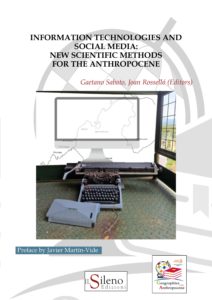
Gaetano Sabato, Joan Rosselló (Eds.)
INFORMATION TECHNOLOGIES AND SOCIAL MEDIA:
NEW SCIENTIFIC METHODS FOR THE ANTHROPOCENE
ISBN 979-12-80064-36-3
Year: 2022;
Pages: 224;
Language: English;
Format: e-book;
Vol. 5, No. 1, May 2022
Description
The development of technology during the Anthropocene has affected science and the ways of “doing science”. Nowadays, new technologies help scientists of several disciplines by facilitating knowledge and how to manage it, but also allow for collaborative science, the so-called “Social Science”, where everyone can be a scientist and be involved in providing data and knowledge by using a computer or a smartphone without being a specialist. But is it really that simple? Actually, the daily and integrated use of different digital technologies and sharing platforms, such as social media, requires important reflections. Such reflections can lead to a rethinking of epistemologies and scientific paradigms, both in human geography and social sciences. This volume titled “Information Technologies and Social Media: New Scientific Methods for the Anthropocene” includes 10 chapters exploring some changes related to the way to do science with a multidisciplinary approach. From classroom experiences to the use of Citizen Science, from Artificial Intelligence use to how Social Media can help researchers, the book reflects on the ICT influence during the last few decades, exploring different cases, complementary perspectives and point of views.
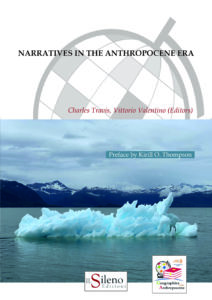
Charles Travis
Vittorio Valentino
(Eds.)
NARRATIVES IN THE ANTHROPOCENE ERA
ISBN 979-12-80064-27-1
Year: 2021;
Pages: 362;
Language: English;
Format: e-book;
Vol. 4, No. 2, December 2021

Description
“The Anthropocene has still the rank of a scientific hypothesis. Yet, it has already sedimented in our imagination with its stories of climate change and mass extinctions, global pandemics and energy crisis, technofossils and oceanic plastic, social justice and new minerals that are changing the face (and the bowels) of the planet. Investigating this imagination from multiple angles, Narratives in the Anthropocene Era, brilliantly edited by Charles Travis and Vittorio Valentino, is an indispensable tool for situating these stories into the conceptual horizon of the environmental humanities”.
(Serenella Iovino, University of North Carolina at Chapel Hill).
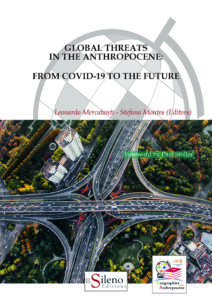
Leonardo Mercatanti
Stefano Montes
(Eds.)
GLOBAL THREATS IN THE ANTHROPOCENE: FROM COVID-19 TO THE FUTURE
ISBN 979-12-800641-8-9
Year: 2021
Pages: 308
Languages: English, French, Italian
Format: e-book
Vol. 4, No. 1, May 2021
Description
The COVID-19 pandemic offers food for thought and an opportunity for humanities and science scholars who research our global condition to collaborate. The 21st-century society is facing an unprecedented challenge right now: what can we learn from this challenge? Will everything really return to what we used to define as ‘normal’ at the end of the emergency? Probably not. Structural changes from political, economic, social, and environmental perspectives are already occurring, and impacting the fields of health, education, commerce, governance, and travel. Concepts of social space are being redefined and rethought at various scales. Our society, unprepared for a global health emergency of this scale, has been engaged only partially in practices of mitigation and sustainability and we now realize the fragility of our planetary existence. This volume collects 14 original chapters which analyse the new scenarios that could lie ahead in the aftermath of the COVID-19 crisis in an interdisciplinary context.
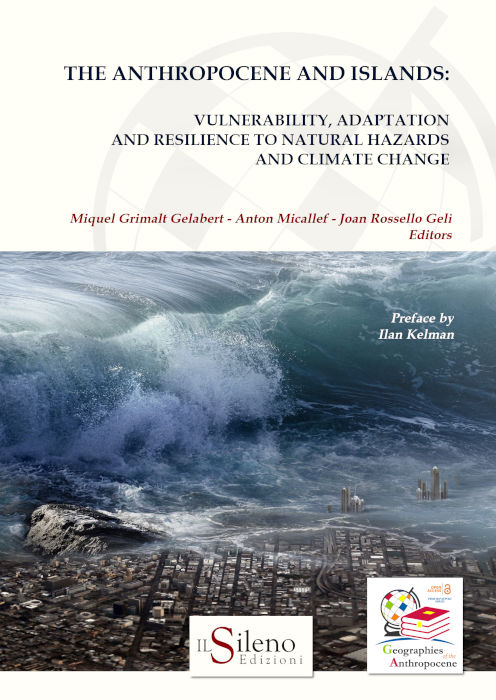 Miquel Grimalt Gelabert
Miquel Grimalt Gelabert
Anton Micallef
Joan Rossello Geli
(Eds.)
THE ANTROPOCENE AND ISLANDS: VULNERABILITY, ADAPTATION AND RESILIENCE TO NATURAL HAZARDS AND CLIMATE CHANGE
ISBN 979-12-800640-2-8
Year: 2020
Pages: 243
Languages: English, French, Spanish, Italian
Format: e-book
Vol. 3, No. 2, November 2020

Description
The Anthropocene and islands: vulnerability, adaptation and resilience to natural hazards and climate change include 8 original research chapters, of authors from around the World, explaining how islands are affected by natural hazards and global change. The volume contributions range from small islands in Alaska to large ones such as Sicily in the Mediterranean and focus on facts such as water resources, sustainability and societal impacts of risk and climate change. The author’s reflections share a wide scientific approach that will enrich a subject, islands and its future, which will become more and more important in the next decades.
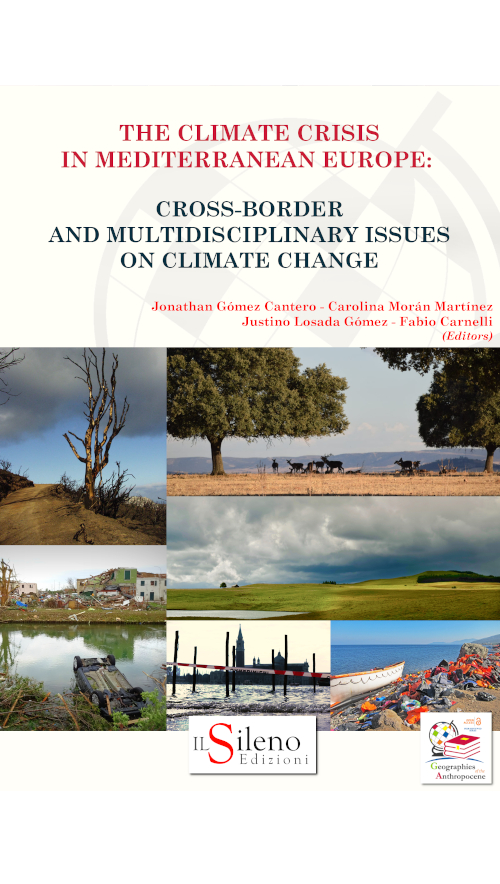
Jonathan Gómez Cantero
Carolina Morán Martínez
Justino Losada Gómez
Fabio Carnelli
(Eds.)
THE CLIMATE CRISIS IN MEDITERRANEAN EUROPE: CROSS-BORDER AND MULTIDISCIPLINARY ISSUES ON CLIMATE CHANGE
ISBN 979-12-80064-00-4
Year: 2020
Pages: 200
Languages: English, Spanish, Italian
Format: e-book
Vol. 3, No. 1, May 2020
Description
“The climate crisis in Mediterranean Europe: cross-border and multidisciplinary issues on climate change” collects 8 original essays by different authors concerning socio-environmental issues related to climate change in a historical border area of Southern Europe. This volume, fostering the current scientific debate on the consequences of climate change, becomes a valuable element for its better understanding from a multidisciplinary perspective, as it shows several studies both theoretical and empirical on different topics: contaminant emissions, social and population dynamics across borders, education and perception of climate change by teenagers, the diffusion of alien vegetation in European ecosystems, and current models of natural and agrarian management.
These topics put forward the facets of a complex multiscale process, which requires a necessary discussion between different scientific, political and social stakeholders. We need now to achieve a better collective awareness about the vulnerabilities arising and threatened by climate change in the Mediterranean Basin.
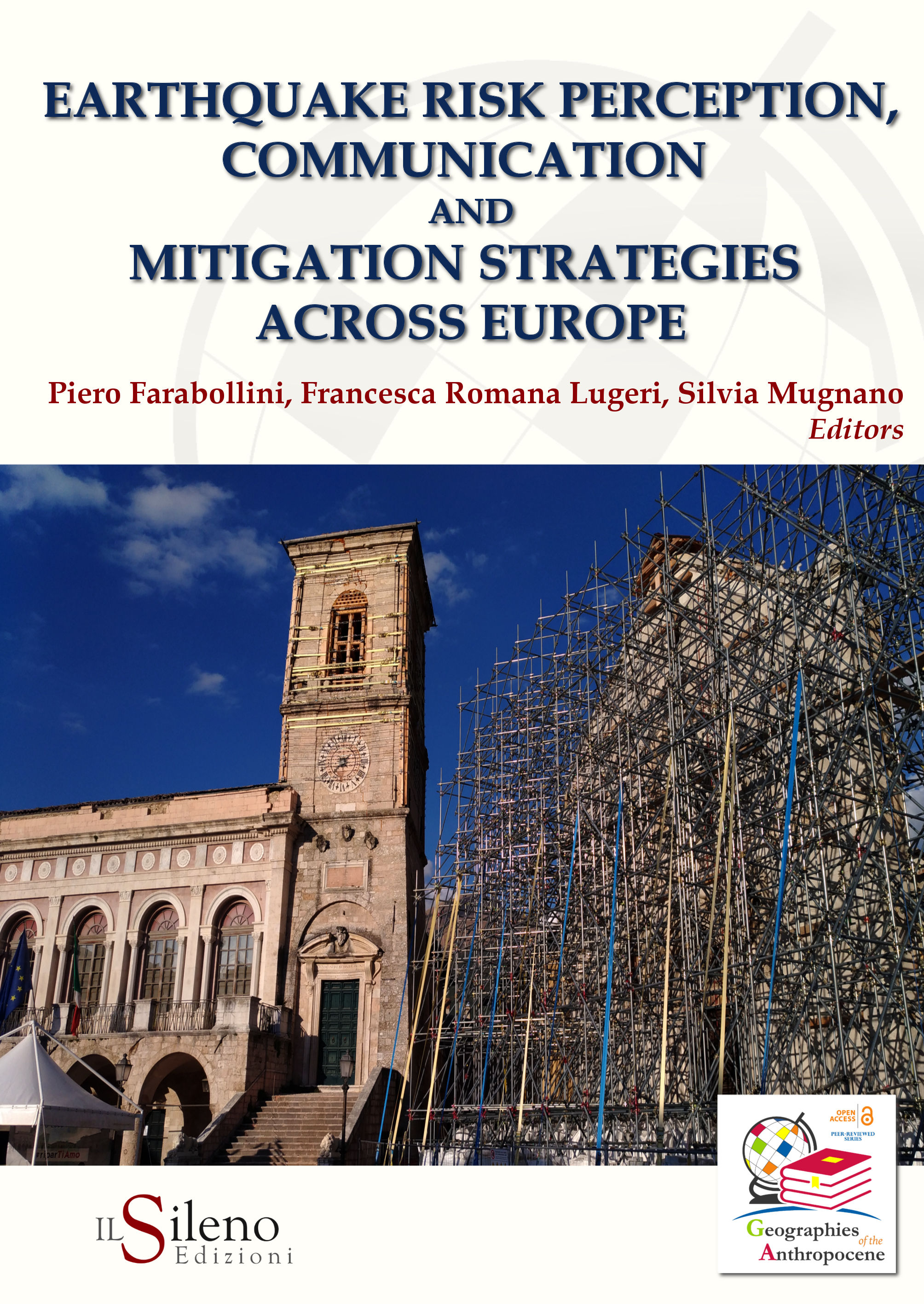
Piero Farabollini
Francesca Romana Lugeri
Silvia Mugnano
(Eds.)
EARTHQUAKE RISK PERCEPTION, COMMUNICATION AND
MITIGATION STRATEGIES ACROSS EUROPE
ISBN 978-88-943275-6-4
Year: 2019
Pages: 310
Language: English
Format: e-book
Vol. 2, No. 2, December 2019
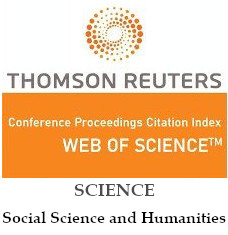
INDEXED
Description
Increasingly, socio-natural risks and disasters represent the result of an unsustainable interaction between human beings and environment. The current scientific debate has generally agreed on the idea that the impact of natural hazards needs to take into account the social vulnerabilities and exposures to risk of the affected population. The most recent earthquakes have unequivocally shown the complexity of the phenomena and their multi-scale dynamics. Indeed, the territory is the combination of natural, social and cultural environment and only by exploring its anatomy and physiology, it will be possible to manage and protect it in the best way.
This volume collects a quite wider range of national and international case studies, which investigate how socio-natural risks are perceived and communicated and which strategies the different communities are implementing to mitigate the seismic risk. This publication has been possible thanks to a fruitful discussion that some scholars had at the 36th General Assembly of the European Seismological Commission held in Malta from 2 to 7 September 2018.
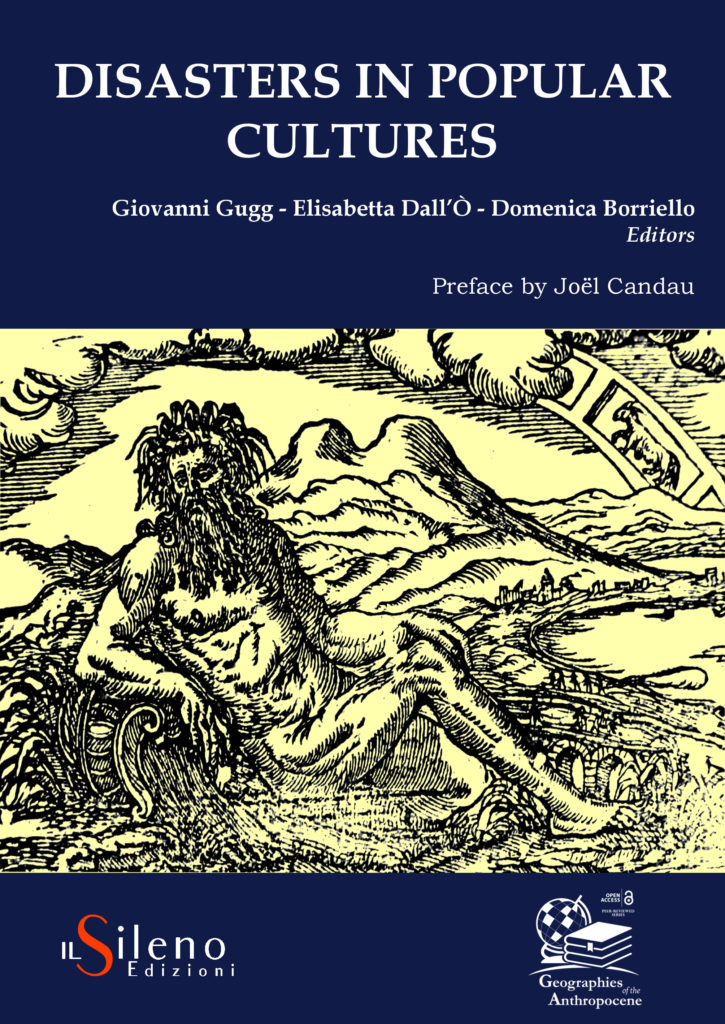
Giovanni Gugg
Elisabetta Dall’Ò
Domenica Borriello
(Eds.)
DISASTERS IN POPULAR CULTURES
ISBN 978-88-943275-3-3
Year: 2019
Pages: 253
Languages: English, French, Italian
Format: e-book
Vol. 2, No. 1, April 2019

Description
Generations pass on to each other a specific selection of memories, which is a “memory of the lived experience”. Through that narrative, the story of the present is measured day by day with forms of existential precariousness, in a vision of risk which is conceived as a perennial societal state. By investigating popular and oral literature, focus on narratives related to risk and disasters, as described in the social imaginary, from the most remote eras to the most stringent current affairs, this book is a precious element for a comprehensive reconstruction of cultural resources have allowed to face and manage material and spiritual concerns and problems arising from disasters.
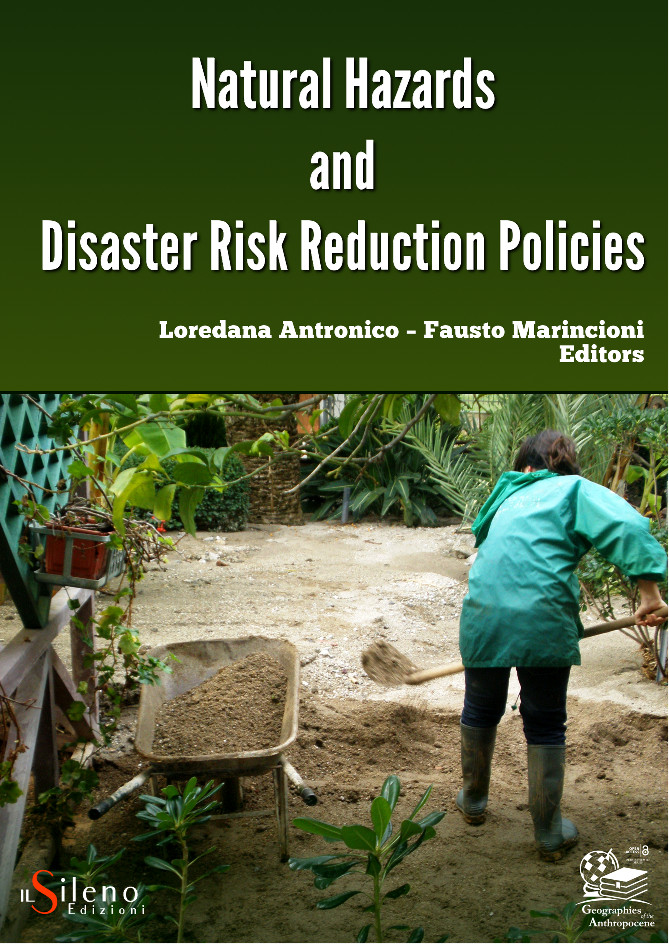
Loredana Antronico
Fausto Marincioni
(Eds.)
NATURAL HAZARDS
AND DISASTER RISK REDUCTION POLICIES
ISBN 978-88-943275-2-6
Year: 2018
Pages: 287
Language: English
Format: e-book
Vol. 1, No. 2, December 2018

Description
Natural Hazards and Disaster Risk Reduction Policies collects 14 original essays, of authors from all around the World, exploring strategies and ability of local communities to adjust to natural hazard and disasters. The volume, fostering the current scientific debate on disaster ecology, muses about the need for Homo sapiens to define its rights and responsibilities in environmental dynamics, including extreme events and disasters. In the end, the reflections about how to deal with hazard, vulnerability and disasters, highlights the ethical nature of disaster risk reduction; control of nature or adaptation to its cycles?
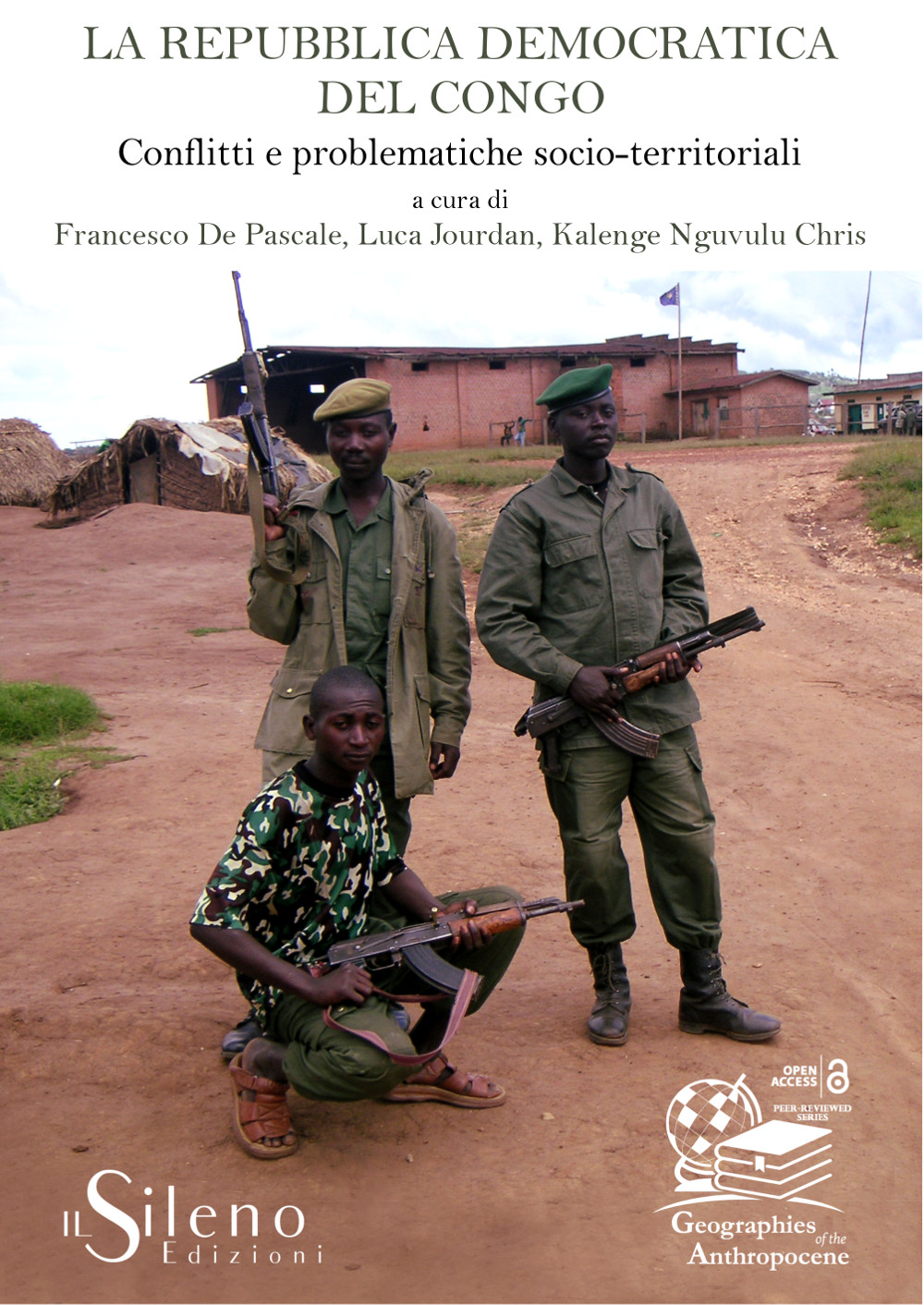
Francesco De Pascale
Luca Jourdan
Kalenge Nguvulu Chris
(Eds.)
LA REPUBBLICA DEMOCRATICA DEL CONGO:
Conflitti e problematiche socio-territoriali
ISBN 978-88-943275-0-2
Year: 2018
Pages: 221
Language: Italian
Format: e-book
Vol. 1, No. 1, March 2018

Description
Since 1996, the Democratic Republic of Congo has fallen into a war and political crisis that is still ongoing. Its mineral resources have fueled a predatory economy that has involved the neighboring countries, particularly Uganda and Rwanda. But Congo’s problems have deeper roots: the current crisis is also the reverberation of a particularly violent colonial past that is still casting heavy shadows on the present. The war has caused millions of deaths and currently the country runs the risk of an authoritarian takeover. Starting from different disciplinary approaches, the authors of this book provide some key concepts to understand one of the most complex and violent crises in our contemporary world.



 Support "Il Sileno"
Support "Il Sileno"